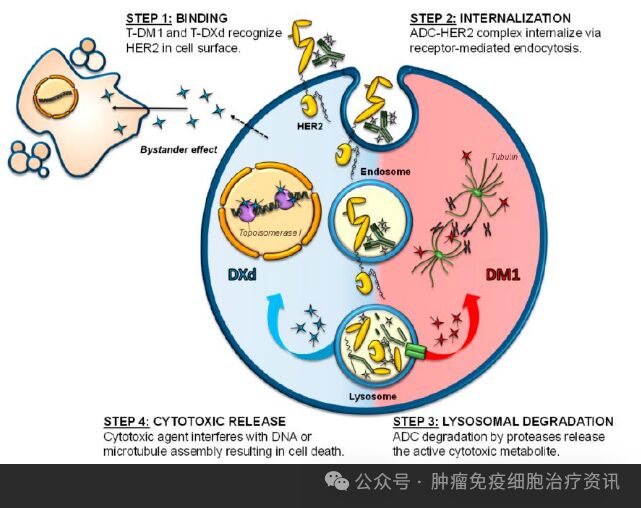Skip to content
ADC (Antibody-drug conjugate) is a new type of drug for cancer treatment. It is a complex formed by combining anti-tumor drugs with antibodies, allowing for precise delivery of the drug into tumor cells, thereby achieving targeted treatment of tumor cells. However, with the widespread application of ADCs, research has found that the issue of ADC resistance has gradually become prominent.

Research shows that there are at least 8 different resistance mechanisms for ADCs.
First, changes in target antigen expression are a common mechanism of ADC resistance. Tumor cells can evade the effects of ADCs by altering the expression level or surface structure of the target antigen, thereby reducing the drug’s ability to kill tumor cells.
Secondly, changes in the endocytic pathway are also an important mechanism of ADC resistance. Tumor cells can lower ADC absorption and internal release by altering the activity or selectivity of the endocytic pathway, thereby reducing cellular sensitivity to the drug.
Changes in lysosomes represent another mechanism of ADC resistance. Lysosomes are membrane structures within cells that function to degrade foreign substances and waste. Tumor cells can reduce ADC degradation and effects within the cell by altering the structure and function of lysosomes.
Increased expression and activity of drug efflux pumps is also an important mechanism of ADC resistance. Tumor cells can rapidly expel ADCs from the cell by overexpressing or increasing the activity of drug efflux pumps, thereby reducing the internal accumulation and action of the drug.
Changes in the cell cycle are another important factor affecting ADC efficacy. Cells exhibit different sensitivities to drugs at different stages of the cell cycle. Tumor cells can evade the effects of ADCs by altering the progression and speed of the cell cycle, thus diminishing drug efficacy.
Alterations in DNA damage repair (DDR) pathways are significant mechanisms of ADC resistance. Tumor cells can reduce the drug’s ability to kill cells by increasing DNA repair capacity or decreasing ADC binding to DNA.
Changes in apoptosis pathways also significantly impact ADC efficacy. Apoptosis is a form of programmed cell death, and ADCs can exert their anti-tumor effects by inducing apoptosis in tumor cells. Tumor cells can diminish the effects of ADCs by altering the activity or selectivity of apoptosis pathways, thus reducing drug efficacy.
Finally, changes in downstream signaling pathways are also important mechanisms of ADC resistance. Tumor cells can evade the effects of ADCs by altering the activity or selectivity of downstream signaling pathways, thereby reducing drug efficacy.
In response to these ADC resistance mechanisms, scientists are actively seeking countermeasures. On one hand, new drugs can be designed and developed to overcome changes in tumor cell target antigens, enhancing drug targeting; on the other hand, combining multiple anti-tumor drugs can avoid the impact of single resistance mechanisms on treatment. Additionally, combining ADCs with other treatment modalities, such as radiotherapy or immunotherapy, can enhance therapeutic efficacy.
In conclusion, ADC resistance issues have a certain impact on the effectiveness of cancer treatment. However, as scientists continue to conduct in-depth research, it is believed that more effective countermeasures will be found in the near future, breaking through the bottlenecks of ADC therapy and providing better treatment options for cancer patients.
1. Strebhardt K, Ullrich A. Paul Ehrlich’s magic bullet concept: 100 years of progress. Nature Reviews Cancer. 2008 Jun;8(6):473.
2. Beck A, Goetsch L, Dumontet C, Corvaïa N. Strategies and challenges for the next generation of antibody–drug conjugates. Nature Reviews Drug Discovery. 2017 Mar;16(5):315-37.
3. Chudasama V, Maruani A, Caddick S. Recent advances in the construction of antibody–drug conjugates. Nature Chemistry. 2016 May;8(12):114-9.
4. Ducry L, Stump B. Antibody-Drug Conjugates: Linking Cytotoxic Payloads to Monoclonal Antibodies. Bioconjugate Chemistry. 2010 Aug 13;21(1):5-13.
5. Polakis P. Antibody Drug Conjugates for Cancer Therapy. Pharmacological Reviews. 2016 Jan;68(1):3-19.




